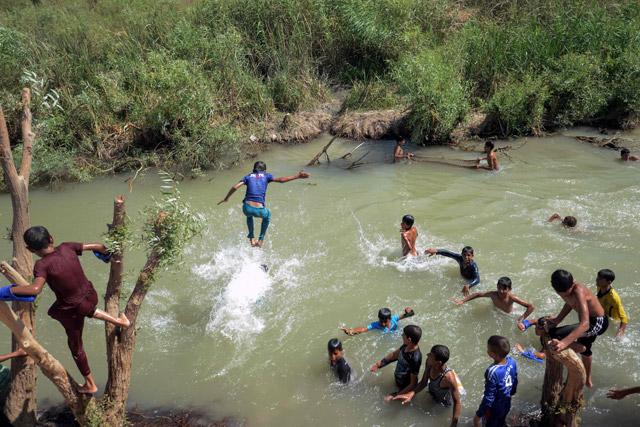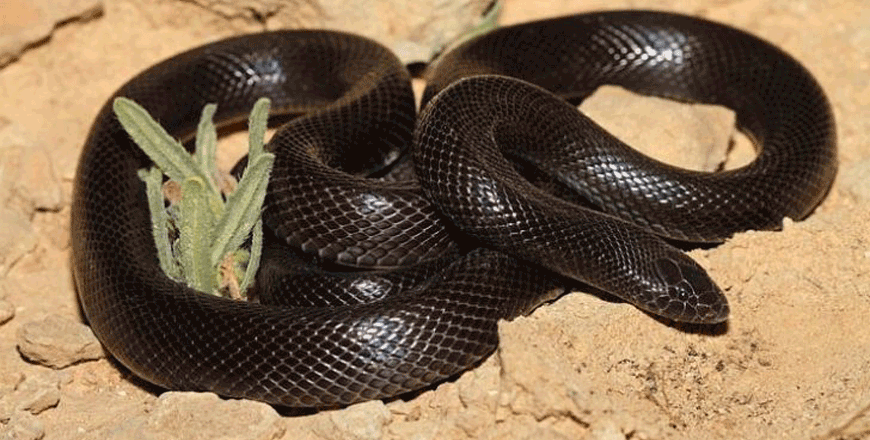You are here
Scorpions the new threat for displaced Mosul civilians
By AFP - Jun 08,2017 - Last updated at Jun 08,2017
KHAZIR, Iraq — They survived the fighting in their home town but displaced Mosul residents now face the threat from snakes and scorpions infesting some of the tented camps they are crammed into.
In Khazir camp, one of the largest for civilians displaced by the battle against the Daesh terror group in Mosul, the searing Iraqi summer has arrived and reptiles and insects are multiplying.
Some 32,000 people who fled the tyranny of the extremists live in a sea of around 7,000 tents, but a recent spike in cases of scorpion stings and snake bites is spreading a new kind of paranoia.
Luai Mohammed Yusef used a plastic crate and some string to build a cradle for his six-week-old daughter and suspended it in the centre of his tent to keep creepy crawlies and other such creatures at bay.
“I couldn’t provide her with a real bed because I can’t afford it. So I made this,” said Luai who arrived in Khazir with his wife and newborn baby a month earlier.
“She stops crying when I put her in it to sleep,” said the 22-year-old.
According to the Iraqi government, more than 800,000 people have been forced from their homes since a huge offensive was launched in October 2016 to dislodge Daesh from Mosul, a city the extremists took three years ago.
Most of them were displaced since an operation on the western side of the city began on February 19.
Luai’s daughter Siham slept peacefully in her makeshift cot, dangling from the tent’s frame.
“At the beginning she would sleep on the floor, but one day I got scared when I saw some kind of centipede crawl up to her,” he said.
“I panicked at the idea she could be bitten by a reptile.”
Hundreds
of scabies cases
Panic started to grip the camp recently when searing temperatures, already hovering around 43°C, descended on the region.
The tents where Iraqis sheltered from frost just a few months ago have now become like ovens, and the arid summer has brought with it a proliferation of snakes, scorpions and other undesirables.
Mohannad Akram, a paediatrician working at a clinic run by the International Medical Corps charity inside Khazir camp, said he had observed a spike in the number of bites and stings among the children he examined.
Nawar Hussein, another 22-year-old camp resident, said he couldn’t sleep at night because he worried that his six-month-old daughter sleeping on the ground would get bitten.
“My daughter also suffers from the heat and since there is no electricity the air cooler provided by the camp administration is useless,” he said.
Akram, who treats dozens of children every day, said the extreme heat was causing hygiene to deteriorate in the camp and had led to cases of scabies being reported.
“We have hundreds of cases of this disease. We responded with specialised care and advice because it is contagious,” he said.
Scabies is a skin infestation caused by a parasitic mite which spreads more easily in areas that are crowded and have limited access to water.
Dastan Mansur, a Khazir camp official, said awareness campaigns had been organised to curb the spread of such diseases.
Related Articles
KHAZIR, Iraq — With bare tree branches as diving boards, they take off and plunge into Iraq’s Khazir River, a rare moment of respite for boy
AMMAN — In addition to harming the environment and ecosystem, experts have identified the phenomenon of killing non-poisonous snakes as the
A 19-year-old Kufranjah resident was recovering in hospital on Saturday after a snake bit him on the foot. Iman Public Hospital Director Ahmad Zghoul said the teenager is in good condition and is being monitored after receiving the proper antidote.

















